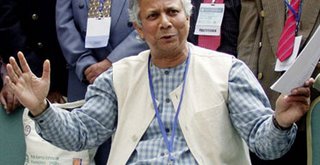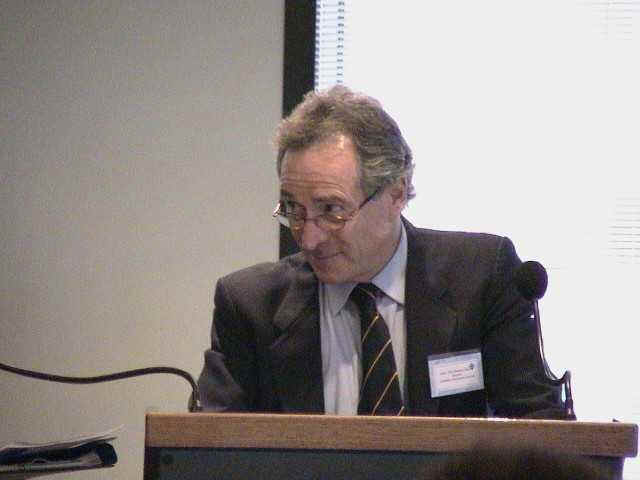Australia faces damaging consequences with global warming
Peter Wilson, Europe correspondent
October 31, 2006
AUSTRALIA has been identified by the Stern report as one of the most vulnerable countries in the developed world to the economic and social impacts of global warming.
While wealthy countries are better placed than poorer nations to cope with the massive changes to be wrought by climate change, that burden will not be spread evenly, the report warns, and Australia faces a tougher time than many northern nations.
The impacts will become more damaging from north to south, the report warns, citing more extreme weather changes, more severe bushfires, droughts and water shortages, damage to Australia's tourism industry and the potential devastation of vast areas of farming.
Big cities such as Sydney and Brisbane could also face new perils from tropical diseases which have previously been limited to less populated zones, the report says.
A rise of 4C in average temperatures could knock entire Australian farming regions out of production, with Western Australia cited as one vulnerable region.
"Australia, as the world's driest continent, is particularly vulnerable to the impact of rising sea temperatures on the major Pacific and Indian ocean currents. These determine both overall rainfall patterns and unpredictable year-to-year variations," says the report by former World Bank chief economist Nicholas Stern.
"Over the last 30 years, stronger tropical typhoons have brought higher storm damage, but increased rainfall, to a wide swath of North West Australia.
"At the same time, the east coast – home to over 70 per cent of the population and location for most major cities and crop farming – has suffered longer droughts and declining rainfall. Southerly regions have lost most rainfall as the warmer ocean and related air currents have pushed rain further south.
"The 2002 drought cut farm output by 30 per cent and shaved 1.6 per cent off GDP. Water supply to big cities will become more difficult – Melbourne's could fall by 7 to 35 per cent with only 2C of warming.
"Drier and hotter summers threaten the survival of the Queensland rain forest. Warmer winters and reduced snowfall, endanger the habitat of mountain top fauna and flora. Rising ocean temperatures threaten the future of Australia's coral reefs and the fishing and tourist industries.
"Higher inland temperatures are likely to cause more bush fires. Tropical diseases are spreading southward as the north becomes wetter. The dengue fever transmission zone could reach Brisbane and possibly Sydney with 3C of warming."
Looking at the broad economic impact of climate change, the report concluded that there could be a broad northward shift in economic activity and population in regions such as the North America or Europe, as southern regions begin to suffer disproportionate increases in risks to human health and extreme events, coupled with loss of competitiveness in agriculture and forestry, reduced water availability and rising energy costs.
"'Low levels of warming in mid to high latitudes – US, Europe, Australia, Siberia and some parts of China – may improve the conditions for crop growth by extending the growing season and/or opening up new areas for agriculture.
"Further warming will have increasingly negative impacts as damaging temperature thresholds are reached more often and water shortages limit growth in regions such as southern Europe and western US.
"At temperature rises above three degrees, large parts of the world (will) become too hot or too dry for agricultural production, such as parts of Africa and even Western Australia.
"By 4C, entire regions may be too hot and dry to grow crops, including parts of Australia. Agricultural collapse across large areas of the world is possible at even higher temperatures (5C or 6C) but clear empirical evidence is still limited.
"In many lower latitude regions, such as southern Europe, western USA, and Western Australia, increasing water shortages in regions where water is already scarce are likely to limit the carbon fertilisation effect and lead to substantial declines in crop yields.
"In Australia, winter rainfall in the southwest and southeast is likely to decrease significantly, as storm tracks shift polewards and away from the continent itself. River flows in NSW, including those supplying Sydney, have been predicted to drop by 15 per cent for a 1C to 2C rise in temperature.
"If flood management is strengthened in line with the rising risk, the costs may only increase twofold.
"The cooler climates of many developed countries mean that small increases in temperature (2C or 3C) may increase economic output through greater agricultural productivity, reduced winter heating bills and fewer winter deaths. But at the same time, many developed regions have existing water shortages that will be exacerbated by rising temperatures that increase evaporation and dry out land that is already dry (southern Europe, California, southwest Australia).
Australia's position as a major coal exporter will require sustained investment in technologies to reduce emissions from the burning of coal, which, in turn, will require predictable and far-sighted government policies, the report says.
To read the original article from The Australian, click on:
The Australian








